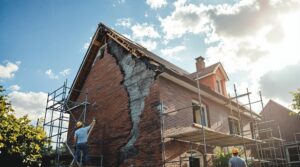Structural engineering fees operate on three primary models: percentage-based (0.5-5% of construction costs), hourly rates ($70-250), and flat-rate services ($350-800). Basic inspections start at $150, while extensive evaluations average $550. New construction projects range from $1,600-12,500, with renovations typically costing $1,900-3,700. Geographic location and professional certifications influence rates notably, with urban areas commanding premium fees. Understanding these fee structures reveals the full scope of engineering service costs.
Key Takeaways
- Structural engineers charge 1-5% of construction costs for residential projects and 0.5-2.5% for commercial projects.
- Basic structural inspections average $550, while specialized assessments like foundation inspections can cost over $1,200.
- Hourly rates for structural engineering services typically range from $70 to $250, with experienced professionals charging higher rates.
- Geographic location impacts fees significantly, with urban areas charging up to $3,000 compared to rural fees of $200-$800.
- Custom design plans can cost between $700 and $10,000, with additional revision charges ranging from $300 to $700.
Understanding Basic Structural Engineering Fee Structures
A thorough understanding of structural engineering fee structures requires familiarity with several common pricing models used in the industry. Structural engineer costs typically follow three primary formats: percentage-based fees, flat-rate services, and hourly billing arrangements.
Percentage-based fees generally range from 1% to 5% of the total construction budget for residential projects, with variations dependent on project complexity. Flat-rate services include structural inspections, averaging $550, while specialized assessments like foundation inspections can reach $1,200 or more.
For customized work, engineering costs operate on an hourly basis, averaging $150 per hour. Custom structural engineering plans demonstrate significant price variation, spanning from $500 to $3,000 for standard projects, with complex designs potentially reaching $12,000.
Geographic location heavily influences fee structures, as urban areas typically command higher rates due to increased operational costs and stricter regulatory requirements. This variability in pricing models allows clients to select fee arrangements most suitable for their specific project requirements.
Average Cost Ranges for Engineering Services

Structural engineering services encompass a broad spectrum of cost ranges that vary significantly based on project scope and complexity. The structural engineer cost typically falls between $350 and $800 nationally, though projects can range from $200 to $3,000. Engineer inspection costs generally start at $150 and can reach $1,000, with thorough home inspections averaging $350 to $900.
For construction projects involving new houses, structural engineering fees typically range from $1,600 to $12,500. Renovation projects command fees between $1,900 and $3,700, reflecting the specialized expertise required.
The average hourly rate for structural engineers ranges from $70 to $250, with most charging approximately $150 per hour. When engineering design plans are needed for larger construction projects, costs typically range from $500 to $3,000, depending on project requirements and intricacy.
These fees generally include the preparation of a detailed structural report and necessary documentation.
Inspection and Report Cost Breakdown

The thorough breakdown of structural engineering inspection costs reveals distinct price tiers based on service type and evaluation depth.
Standard structural engineer inspections typically range from $150 to $1,000, with an average fee of $550 for extensive evaluations.
Home inspections constitute a significant segment, averaging between $350 and $900, requiring 1.5 to 3 hours to complete.
Foundation inspection costs, which are essential for evaluating structural integrity, generally fall between $300 and $750. When engineers report critical foundation issues, more detailed analyses may be necessary, potentially elevating costs above $1,200.
Roof evaluations represent another key inspection category, with costs spanning from $150 to $600.
The engineers report may identify necessary repairs, which can result in additional expenses ranging from $3,000 to $6,000 for significant structural modifications.
These inspections to confirm structural soundness variations reflect the complexity and scope of each evaluation type.
Design Plans and Drawing Expenses

Structural engineering design plans reflect a tiered pricing structure, with basic pre-drawn plans starting at $700 and custom designs reaching up to $10,000.
Drawing fees typically follow an hourly rate system ranging from $30 to $120, based on the engineer's expertise level and project complexity.
The final cost of structural plans correlates directly with design variables such as building size, architectural intricacy, and required revisions, which can push extensive engineering packages toward $12,000 for large-scale projects.
Plan Creation Cost Breakdown
Creating engineering plans represents a significant portion of structural project costs, with typical expenses ranging from $500 to $3,000 for standard designs.
The cost of hiring structural engineers varies based on project complexity and scope, with hourly drafting rates between $30 and $120.
Custom house plans demand higher design fees, typically ranging from $2,000 to $10,000, while pre-drawn options offer more economical solutions at $700 to $1,500.
The total construction cost includes potential revision charges of $300 to $700, reflecting necessary modifications during the planning phase.
For extensive projects, structural engineering costs per square foot can accumulate, with thorough design plans reaching up to $12,000.
Plan creation cost factors encompass the engineer's expertise, project location, and design intricacy.
Common Drawing Fee Structures
When considering structural engineering services, professionals generally structure their drawing fees according to established industry frameworks that encompass both hourly rates and project-based pricing.
Engineers typically assess projects based on complexity and scope to determine the most suitable fee structure.
Common fee structures include:
- Hourly rates for structural drawings ranging from $30 to $120 per hour
- Project-based pricing for custom house plans, averaging $2,000 to $10,000
- Commercial project calculations at $0.36 to $0.45 per square foot
The average cost for structural engineering plans varies greatly based on project scale.
While basic residential plans may start at $500, complex commercial projects can exceed $12,000.
Additional considerations include revision fees, which typically range from $300 to $700 per modification.
Design Complexity Price Factors
The complexity of design plans directly influences structural engineering costs through a combination of required drawing sheets, calculation intricacy, and project-specific requirements.
Structural engineer fees escalate proportionally with design complexity, ranging from $500 for basic projects to $12,000 for intricate structures. The scope of work determines drawing costs, with hourly rates varying between $30 and $120 for drafting services.
Project budget planning must account for potential revisions, which typically add $300 to $700 to the initial cost estimate.
Custom designs command higher fees ($2,000-$10,000) compared to pre-drawn plans ($700-$1,500), reflecting the additional expertise and time required.
Design complexity factors include specialized calculations, detailed specifications, and the number of structural elements requiring documentation, all of which impact the final engineering charges.
Factors That Impact Engineering Rates

Multiple key variables determine the rates charged by structural engineers for their professional services.
Project complexity and geographic location greatly influence engineering rates, with more intricate designs and high cost-of-living areas commanding premium fees. Experience level plays a vital role, as seasoned structural engineers typically charge between $100-250 per hour based on their expertise and track record.
- Scope of work directly affects pricing through:
- Number of required drawings
- Revision requirements
- Additional technical specifications
- Project complexity impacts fees due to:
- Design intricacy
- Technical challenges
- Required expertise level
- Client-related factors influence rates through:
- Frequency of design changes
- Communication requirements
- Project timeline modifications
These factors collectively determine the final engineering rates, making it essential for clients to understand how their project requirements and decisions can impact the overall cost of structural engineering services.
Commercial vs. Residential Project Pricing

Structural engineering fees differ substantially between commercial and residential projects, reflecting distinct scopes, complexities, and regulatory requirements.
Residential project fees typically command higher percentage rates, ranging from 1% to 5% of the construction budget, while commercial construction projects generally require 0.5% to 2.5% of total costs.
New house constructions typically incur structural engineer fees between $1,600 and $12,500, with renovations ranging from $1,900 to $3,700 for engineering services.
Home extensions specifically fall within the $2,200 to $3,700 range.
Commercial projects, despite lower percentage rates, often result in higher absolute costs due to larger project scales, with complex projects reaching up to $100,000 for detailed engineering work.
Basic residential engineering services start at $500, offering a more accessible entry point for smaller projects.
These pricing structures reflect the varying complexity, scale, and technical requirements between residential and commercial sectors.
Regional Cost Variations Across Markets

Geographic location greatly influences structural engineering fees, with major metropolitan areas commanding premium rates up to 10% higher than the national average of $540 due to elevated operating costs and heightened demand.
The disparity between rural and urban markets extends beyond basic fee structures, as urban zones often require additional regulatory compliance and specialized expertise that further impacts pricing.
State-specific variations emerge from local building codes, seismic considerations, and market conditions, creating distinct pricing tiers across different regions of the country.
Major Metropolitan Rate Premiums
Market dynamics in major metropolitan areas greatly influence structural engineering fees, creating distinct rate premiums above national averages.
High cost of living and increased operational expenses in urban centers drive structural engineer charges notably higher than in less populated regions. Geographic location plays a critical role, with experienced engineers commanding premium rates due to complex urban projects and stringent local building codes.
Key factors contributing to metropolitan rate premiums:
- Hourly rates in major cities like San Francisco and New York reaching $250, compared to $150 in rural areas
- Construction budget percentages for residential projects typically ranging 1-5% higher in urban settings
- Market competition and demand pushing fees 1-10% above national averages, particularly in high-density areas
Rural Vs Urban Pricing
The disparity between rural and urban structural engineering fees reflects broader economic patterns across diverse regional markets. Geographic location substantially influences engineering costs, with urban areas commanding premium rates due to higher living expenses and increased demand. While rural markets typically see fees ranging from $200 to $800, urban structural engineer fees can reach $3,000 for comparable services.
| Region Type | Fee Range | Construction Budget % | Safety Measures | Market Demand |
|---|---|---|---|---|
| Urban Core | $800-3,000 | 3-5% | Enhanced | High |
| Suburban | $600-2,000 | 2-4% | Standard | Moderate |
| Rural | $200-800 | 1-2% | Basic | Low |
| Coastal | $1,000-3,500 | 3-5% | Advanced | High |
| Mountain | $500-1,500 | 2-3% | Specialized | Moderate |
In residential settings, construction budget percentages vary from 1% to 5%, with projects in disaster-prone regions requiring additional safety measures that further impact costs.
State-by-State Cost Analysis
Regional variations in structural engineering fees demonstrate distinct patterns across state lines, with costs typically correlating to local economic conditions, regulatory requirements, and market demand. High-cost states like California and New York command premium rates, reflecting both elevated living expenses and stringent local building regulations.
Key factors influencing state-by-state cost variations include:
- Urban areas averaging 1-2% of construction costs for structural engineering services, while rural regions range from 0.5-1%.
- Coastal states with natural disaster risks requiring additional safety standards and inspection reports, resulting in higher fees.
- Metropolitan zones commanding $250-400 hourly rates compared to $70-150 in less populated areas.
These regional variations highlight the importance of understanding local market conditions when budgeting for structural engineering services.
Types of Payment Models and Billing Methods

Professional structural engineers employ several distinct payment models to bill their services, with each method designed to align with specific project scopes and client requirements. These models include flat fees for specific inspections, hourly rates for consultations, and percentage-based fees calculated from total construction budgets.
| Payment Model | Rate Range | Best Suited For |
|---|---|---|
| Flat Fee | $300-$700 | Single Inspections |
| Hourly Rate | $70-$250 | Consultations |
| Percentage | 1%-5% | Residential Projects |
| Design Plans | $30-$120/hr | Basic Drawings |
| Custom Design | $2K-$10K | Complex Projects |
For new constructions, design fees typically constitute 4% to 8% of overall construction costs. Additional costs may arise from plan revisions, which generally range from $300 to $700. Engineering firms often customize their billing approach based on project complexity, timeline, and scope of required services.
Professional Certifications and Their Cost Impact

While basic structural engineering services form the foundation of the industry, advanced professional certifications greatly impact fee structures and service costs. Structural engineers holding PE or SE certifications typically command 10-20% higher fees due to their enhanced expertise and qualifications.
These certifications require significant investment in both initial examination costs and ongoing continuous education requirements.
Key factors influencing certification-related costs include:
- Initial certification expenses ranging from $150 to $500 for exam and application fees
- Mandatory continuous education requirements to maintain professional standing
- Specialized certifications in areas like seismic or wind engineering that demand premium rates
The impact of professional certifications extends beyond direct fee structures. Engineers with advanced credentials often benefit from reduced liability insurance premiums, which can influence their overall pricing strategy.
These certifications ultimately validate expertise and justify higher service fees while ensuring clients receive qualified professional services.
Frequently Asked Questions
How Much Should a Structural Engineer Charge?
Structural engineer charges vary based on project complexity, service scope, and location impact, typically ranging 0.5-5% of construction costs, with consultation fees reflecting market rates, experience level, and engineering standards.
How Much Do Structural Engineers Charge?
Like building blocks forming a foundation, structural engineer rates vary: $150-250 hourly, $350-800 for consultations, 1-5% of construction costs, with complexity factors and regional differences affecting final pricing.
How Much Does a Structural Engineer Report Cost?
Structural engineer reports typically cost £500-£2,000, with engineering report fees varying based on location-based fees, project complexity, residential evaluation pricing, and commercial service charges for thorough structural assessments.
How Much Does It Cost to Have a Structural Engineer Look at a House?
Structural engineer house inspection costs typically range from $150-$1,000, with fee comparisons varying by project complexity, service types, location factors, and engineer qualifications. Standard pricing structures average $350-$800 for thorough evaluations.
Final Thoughts
Like a well-designed steel beam distributing loads across multiple points, structural engineering fees follow calculated patterns based on project scope, location, and complexity. The investment in qualified structural engineering services mirrors the foundation of a building itself: precise calculations and systematic analysis guarantee long-term stability. Understanding these fee structures enables stakeholders to properly allocate resources while maintaining professional standards across the engineering spectrum.
For homeowners dealing with property damage related to their homeowners insurance policy, insurance industry insiders and legal experts strongly advise consulting with a qualified state-licensed public adjuster for damage or loss insurance claims. Public adjusters work exclusively for policyholders, not insurance companies, serving as advocates throughout the claims process. These state-licensed professionals help navigate complex insurance policies, identify hidden damages often unknown to policyholders, document losses comprehensively, and negotiate with insurance companies to ensure fair settlements while protecting policyholder rights.
Working with a public adjuster can maximize claim payouts, expedite the claims process, and reduce the stress of dealing with insurance companies, allowing homeowners to focus on recovery. Policyholders interested in discussing their property damage or loss claims can request a no-obligation free consultation with a Public Claims Adjusters Network (PCAN) member public adjuster through our contact page.








